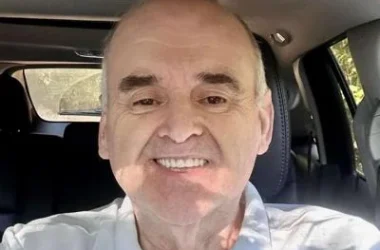
Board of Education member Christine Carder looks over artwork produced by Ohio County school students.
WHEELING, W.Va. — Ohio County Board of Education member Christine Carder says politics and backroom dealing on the board is behind a move to stop members from participating in meetings via phone, and that won’t stop her from vacationing one month out of the year and calling in during that time.
The board is slated to address the issue of phoning in to meetings at 6 p.m. April 13 in the board office, 2203 National Road, Elm Grove.
Carder has returned to Wheeling following a month in Florida, during which time she called in to a total of six board meetings. The board conducted two regular meetings during the month, as well as four special meetings.
In total, Carder has phoned in to 22 meetings since taking office in July 2010, and used Skype for an additional two meetings, according to information provided by the school district.
“There is a witch hunt going on, though I’m not sure what witches they’re going after,” she said. “I’m not leaving my position. I have absolutely no intention of leaving the board. If my physical presence is required, I will be there as much as possible. If I can’t be there, I won’t be there. … I’m not giving up my month in Florida, either.”
Carder said a board member’s participation by phone is permitted under the policy of the West Virginia Board of Education, and “there’s nothing inappropriate or wrong about it.”
She also wonders whether the board is taking a backward move by discouraging the use of communication technology by its members when it is widely used throughout the world to bring together people from different locales for meetings.
A former principal at Wheeling Park High School, Carder serves as executive director of the West Liberty University Foundation Board, where she said telecommuting for meetings is common practice. She said being able to telecommute to a public meeting also allows people who travel for their job – such as fellow board member Sarah Koegler – the added opportunity to serve their community.
“When I ran for the board, I most certainly looked into the fact that I would be out of town for the month of March,” she said. “The law says you can telephone in at any time. We would normally have two meetings in March. I would have missed two meetings. There was never a problem in the past.”
During her most recent re-election bid, the topic was made an issue, Carder said.
“It obviously didn’t matter to the people I represent because I was re-elected,” she said. “If the people think I am not serving them, they can vote me out. But it is certainly not up to other board members to limit my representation because they believe their service is somehow more superior than mine.”
Board member Tim Birch’s proposal wouldn’t limit a board member’s ability to phone in to meetings, but would pay them their meeting salary of $160 for only three meetings during the year when they call in. Carder believes board president Shane Mallett is pushing to have phone call-ins eliminated all together.
“My understanding is they want to make a policy that you must be present at meetings,” she said. “If it’s a matter of pay, that’s not why I’m on the board of education and I (couldn’t) care less.”
Mallett said he is not aware of any publicly elected board that allows its members to participate by phone or Skype.
“If we are elected by the people, we should be there to represent them at the meeting,” he said. “This is scheduled for debate. Where it’s going, what the vote will be, I don’t know if we will vote to keep it, amend it or eliminate it.”
Still, Carder said the proposal is an example of “backroom dealings” that she said are “political,” “retaliatory” and “somewhat discriminatory.”
“I have never been so excluded from decisions being made behind the scenes as I see we are now,” she said. “There’s so much (stuff) going on, and it’s politically motivated.”
Mallett denied there was any backroom politics involved, but rather it was a matter first brought up by Birch shortly after he took office last July.
“I did not put it on the agenda then,” he said. “Just because he brought it up, I thought it would get better.”
The number of call-ins, though, did not improve, according to Mallett. The issue came to a head following the March 9 meeting in which Carder and Koegler both participated by phone. The meeting lasted nearly three hours. While Carder remained on the line until adjournment, Koegler hung up after the first hour to attend a meeting for her employer, Teach for America.
Mallett said he believed then it was time for a policy change.
He also denied there was any “retaliation or discrimination” efforts by members of the board regarding Carder, as most votes by the board are unanimous votes.
In years past, when there was a split 3-2 vote, Carder usually was in the majority, voting with Koegler and former board president Jim Jorden. But after Birch replaced Jorden on the board last year, that changed, Mallett said. Birch usually sides with Mallett and member Gary Kestner on votes.
“Their winning percentage switched when Mr. Birch took office, and that’s not a bad thing – just like it wasn’t when I was in the minority,” Mallett said. “It’s a democracy, and unfortunately for them, they’re now in the minority.”
To read more from The Intelligencer/Wheeling News-Register, subscribe here.





